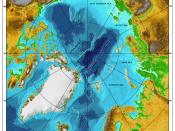John Roach
for National Geographic News
June 25, 2003
Findings reported from the first ever detailed exploration of the Gakkel Ridge--the northernmost segment of the worldwide mid-ocean ridge system that snakes for 1,100 miles (1,800 kilometers) beneath the Arctic Ocean--underscore the waiting discoveries on the frontiers of Earth science.
For decades scientists longingly eyed the Gakkel Ridge. But since it lies beneath a cover of sea ice, access to it has been limited. Apart from a single submarine study, much of what was known about the undersea region's geology was extrapolated from studies of other, more accessible, ocean ridges.
Then in August 2001 an international team of scientists embarked on a rare exploratory mission aboard two icebreakers specially-equipped with scientific instruments to map the seafloor, collect samples, and analyze what really lies three miles (five kilometers) beneath the ice-covered seas.
The team returned nine weeks later with findings that are changing preconceived notions of how the ocean floor forms, said Emily Klein, a geologist at Duke University in Durham, North Carolina.
Researchers discovered that, contrary to expectations, the exceedingly slowly spreading ridge is rife with hydrothermal vents and a hotbed of irregular volcanic activity.
Klein noted that extraordinary technical achievements were needed in order to make the expedition. "People truly thought it could not be done," said Klein, author of a perspective on the Gakkel Ridge expedition and its findings that is published in the current issue of the science journal Nature.
Charles Langmuir, an Earth scientist at Harvard University in Cambridge, Massachusetts, and co-leader of the expedition said, "One thing that brought the three chief investigators into harmony on this expedition was how wrong we all were about what we would find. But nothing could be more exciting than to be so wrong. Discovery means to learn...


